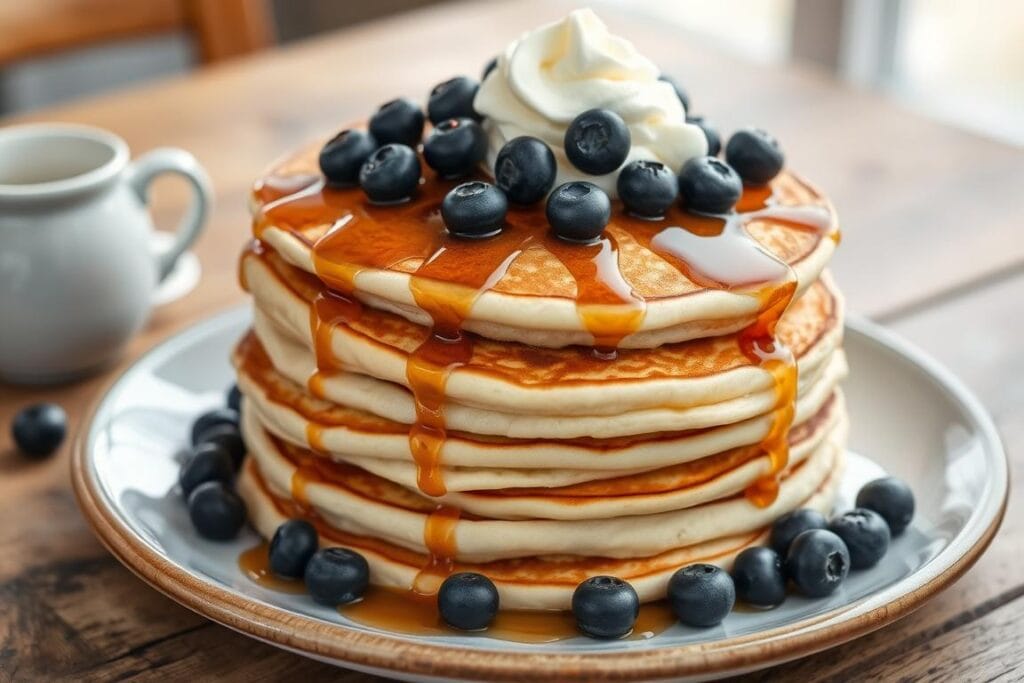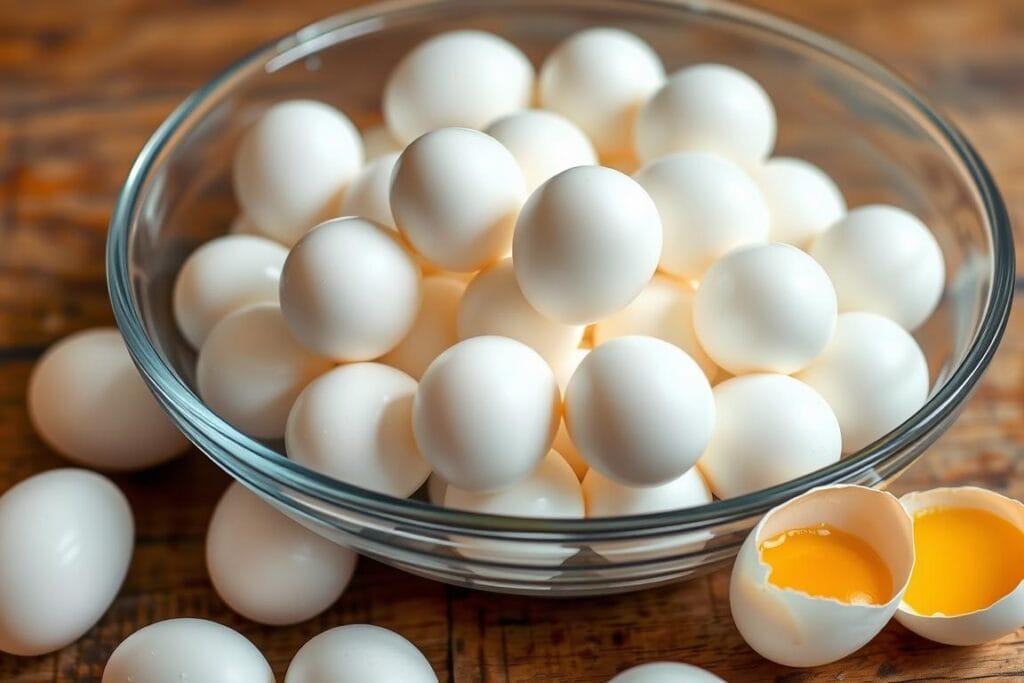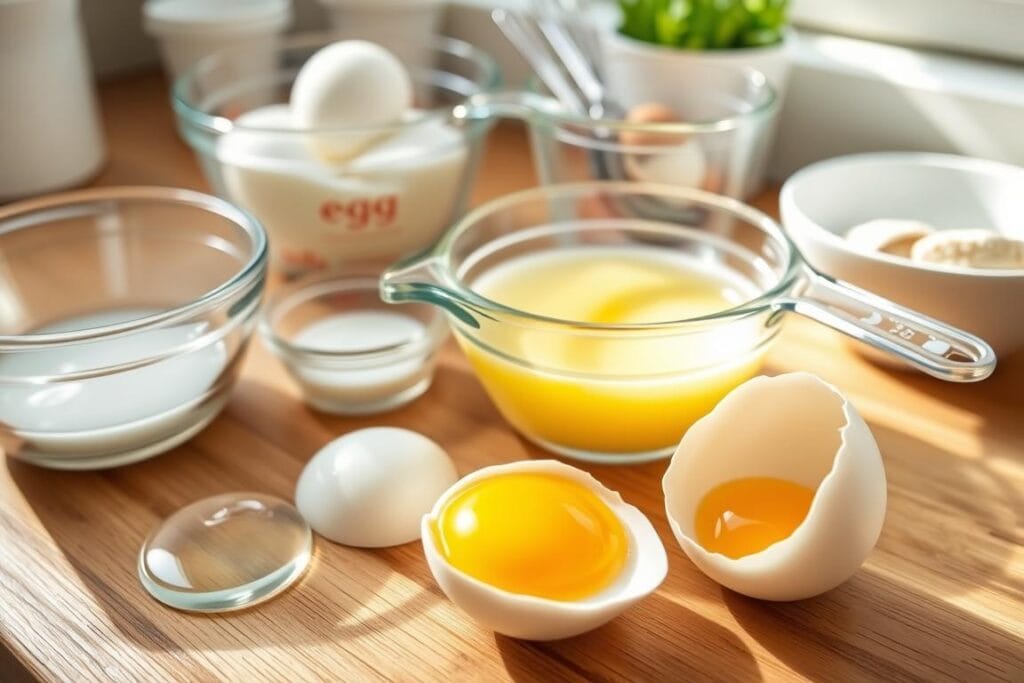
As a seasoned home cook, I’ve always been fascinated by the versatility of egg whites. They can turn simple recipes into culinary masterpieces. For example, they’re key in making American giant pancakes fluffy.
But how many egg whites do you need for that perfect pancake? It’s a question many of us have.
Key Takeaways
- On average, one large egg contains approximately 3 tablespoons of egg white and 1 tablespoon of egg yolk.
- Two large egg whites are equivalent to the amount of egg white in one whole large egg.
- Recipes may call for a specific number of egg whites, such as “2 egg whites,” to ensure the proper ratio of ingredients.
- Separating eggs and using egg whites can be beneficial for those following a high-protein diet.
- Egg white powder is a convenient alternative for recipes that require egg whites, offering a longer shelf life and ease of use.
Understanding Egg White Basics
Egg whites are the clear, thick liquid around the yolk. They are full of water and protein, making them a great choice for health lovers. With 87% water and 10% protein, they have more protein than calories, unlike whole eggs.
What Are Egg Whites Made Of?
Egg whites are mostly water and proteins like albumin and ovalbumin. These proteins help egg whites hold their shape and work well in cooking and baking.
Nutritional Composition
Egg whites have fewer calories and less nutrients than whole eggs. But, they are packed with high-quality protein. One large egg white has about 3.6 grams of protein, with very little fat and carbs. This makes them perfect for adding protein to syrup toppings or diner classics.
Role in Cooking and Baking
Egg whites are key in cooking and baking. They help bind ingredients, stabilize, and even help things rise. You can whip them into a meringue, make fluffy omelets, or add structure to cakes and diner classics.

“Egg whites are a versatile and nutritious ingredient that can enhance the texture and flavor of a wide variety of dishes, from savory to sweet.”
Standard Egg White Measurements and Conversions
Knowing how to measure egg whites is key in cooking and baking. The right buttermilk batter or griddle cooking needs precise egg white amounts. Let’s explore the important details you should know.
One large egg white is about 2 tablespoons. So, 8 to 10 large egg whites make 1 cup. For whole eggs, 5 large eggs beaten together equal 1 cup.
Need to substitute egg sizes? Remember, 1 large egg is the same as 1 medium, 1 small, 1 extra-large, or 1 jumbo egg. But, you might need to tweak amounts if a recipe asks for different egg sizes.
| Egg Size | Equivalent Measurement |
|---|---|
| 1 Large Egg | 2 Tablespoons Egg White |
| 8-10 Large Egg Whites | 1 Cup |
| 5 Large Whole Eggs | 1 Cup |
Remember these egg white measurements and conversions. You’ll soon master your buttermilk batter recipes and excel in griddle cooking.

Liquid Egg Whites vs. Fresh Egg Whites
Choosing the right egg whites can change your brunch game, especially with american giant pancakes. Liquid and fresh egg whites each have their own pluses and minuses. Knowing these differences helps you pick the best for your dishes.
Pasteurization Process
Liquid egg whites are pasteurized, which kills harmful bacteria. This makes them a bit thinner than fresh egg whites. But, it also makes them safe to eat raw, perfect for many recipes.
Storage Differences
Liquid egg whites last longer in the fridge, up to 10 days. Fresh egg whites only last a few days. This makes liquid egg whites great for meal prep and keeping your brunch favorites, like american giant pancakes, fresh.
Usage Recommendations
Liquid egg whites are versatile but might not whip as well as fresh egg whites. Fresh egg whites whip up lighter and fluffier, ideal for meringues or angel food cake. But for american giant pancakes, liquid egg whites work just fine.
Health Benefits of Egg Whites
If you love fluffy pancakes or hearty breakfasts, egg whites are key. They’re low in calories and fat-free. Plus, they’re packed with high-quality protein. A large egg white has about 3.6 grams of protein, great for your breakfast.
Egg whites are good for your health in many ways. They have all nine essential amino acids your body needs. This is great for muscle growth and recovery. It’s perfect for keeping your metabolism healthy or building lean muscle.
Egg whites are also cholesterol-free and low in calories. This makes them great for those watching their calorie intake. They also have vitamins A, B12, and D, choline, and selenium. These nutrients support your overall health and well-being.
- Egg whites are an excellent source of high-quality, fat-free protein.
- Consuming egg whites may help increase protein intake, promote muscle growth, and reduce body fat.
- Egg whites are low in calories and cholesterol-free, making them a heart-healthy choice.
- Egg whites contain essential vitamins and minerals that support overall health and well-being.
Adding egg whites to your fluffy pancakes or breakfast recipes is smart. They offer many nutritional benefits. They keep you energized and satisfied all day.
“Egg whites are a versatile and nutritious ingredient that can elevate any breakfast dish.”
Using a rich dish such as sweet potato and bacon casserole can help balance the lack of fat provided by yolks.
Substitution Guide for Different Egg Sizes
When making diner classics like buttermilk batter, swapping eggs can be a challenge. But with this guide, you can easily adjust your recipes.
Small to Jumbo Egg Conversions
Here’s a simple rule for egg size swaps:
- 4 small eggs = 3 medium eggs = 3 large eggs = 2 extra-large eggs = 2 jumbo eggs
Volume-Based Replacements
For volume measurements, remember this: 1/4 cup of liquid egg substitute is like one large egg. It’s handy when you don’t have the right egg size.
Recipe Adjustments
When changing egg sizes in recipes, think about the total egg volume needed. For instance, if a recipe wants 3 large eggs and you only have medium, use 4 medium eggs. This keeps the volume the same.
| Egg Size | Weight | Volume |
|---|---|---|
| Small | 1.5 oz | 2.5 tbsp |
| Medium | 1.75 oz | 3 tbsp |
| Large | 2 oz | 3.25 tbsp |
| Extra-Large | 2.25 oz | 4 tbsp |
| Jumbo | 2.5 oz | 4.5 tbsp |
Keep in mind, these are just guidelines. For the best results, always use the exact egg size called for in your recipe. Enjoy making diner classics!
American Giant Pancakes with Egg White Variations
Enjoy the ultimate breakfast with these fluffy, American-style giant pancakes. To get the perfect texture, separate the egg whites and whip them until stiff peaks form. Then, gently fold the whipped egg whites into your batter for extra airiness.
For a protein-rich version, mix whole eggs with more egg whites. Serve these pancakes with your favorite syrup toppings like maple, honey, or fresh fruit compote. For a healthier option, try Greek yogurt and berries or a drizzle of nut butter. These pancakes are a hit for breakfast or brunch.
| Prep Time | Cook Time | Total Time | Servings |
|---|---|---|---|
| 15 mins | 30 mins | 45 mins | 6 |
| Calories | Fat | Carbs | Protein |
|---|---|---|---|
| 236 | 14g | 18g | 10g |
- 150g all-purpose flour
- 1 egg
- 300ml milk
- 1 tsp salt
- 2 tsp baking powder
For bigger servings, double the ingredients. Use up to 450g flour, 3 eggs, and 450ml milk. Mix dry and wet ingredients slowly to avoid lumps. Cook the pancakes for 2-3 minutes on each side until they’re golden. Serve with your favorite syrup toppings.
Cooking Applications and Techniques
Egg whites are great for many cooking and baking tasks. They make omelets, frittatas, and scrambled eggs light and fluffy. They also help cakes, cookies, and other baked goods turn out tender and airy.
Egg whites are good for healthier dishes too. They can be used as a low-fat binder in meatloaf or burgers. When making pancakes on a griddle, heat it to 375 degrees Fahrenheit. Cook pancakes about four inches across until the edges bubble before flipping.
Adding egg whites to your brunch favorites boosts nutrition. Using two egg whites for one whole egg is a common trick. It keeps your dishes protein-rich without losing flavor or texture. Egg whites are perfect for making fluffy pancakes or a rich soufflé.
“Egg whites are a low-calorie, fat-free source of protein, making them a popular ingredient in health-conscious recipes.”
Understanding egg whites’ unique qualities is key to cooking with them. Mastering their use opens up a world of tasty and healthy dishes in your kitchen.
Common Mistakes When Using Egg Whites
When making fluffy pancakes or other recipes with egg whites, pay close attention. Avoid these common mistakes to get perfect results every time.
Measurement Errors
Wrong measurements can ruin your recipe. Always use a kitchen scale or measuring cups for exact amounts. Guessing egg white quantities can mess up your fluffy pancakes and breakfast recipes.
Storage Issues
Storing egg whites right is key to keeping them fresh. Always refrigerate them and use within 2-4 days. If you don’t, they might get contaminated or lose their ability to whip.
Temperature Problems
Temperature affects egg whites a lot. Cold egg whites won’t whip up well for meringues. Make sure to warm them up to room temperature before whipping for the best results.
By avoiding these mistakes, you’ll make light and fluffy pancakes and tasty breakfast recipes. Egg whites are really versatile.
| Ideal Pan Temperature | Recommended Fillings | Preheating Requirement |
|---|---|---|
| 375 degrees | A few spoonfuls of blueberries or banana slices | Sizzle when batter is poured |
| Spacing Recommendation | General Heat Rule | Egg White Separation |
| At least one inch apart | Medium heat to prevent burning or lack of crispiness | About one egg white per cup of pancake batter |
Professional Tips for Perfect Egg White Usage
Egg whites are key in diner classics and American giant pancakes. They help get the right texture and rise. As a professional, I’ve gathered some top tips for using egg whites well.
For perfect meringues, make sure your tools are clean of grease or fat. Adding a bit of cream of tartar can also make them fluffier. Separate eggs when they’re cold to avoid mess and make it easier.
For fluffier omelets, whisk the egg whites before mixing them with yolks. This adds air, making the omelet lighter. When baking, gently fold egg whites into batters to keep air bubbles. This makes your baked goods airy and tender.
For the best whipped egg whites, use a copper bowl. The copper reacts with the egg whites, making them stiffer and more stable. This results in a beautiful, firm meringue.
“The secret to perfect egg white usage lies in paying attention to the details – from temperature and tools to folding techniques. Master these fundamentals, and your diner classics and American giant pancakes will reach new heights of deliciousness.”
Safety and Storage Guidelines
Keeping egg whites safe is key to avoiding foodborne illnesses. This is especially true for buttermilk batter or syrup toppings that include egg whites. Following these guidelines is crucial.
Keep egg whites in airtight containers in the fridge for up to 4 days. You can freeze them for up to 12 months. Thaw them in the fridge before using. Always cook egg whites well to avoid bacterial contamination, especially if they’re not pasteurized.
When making buttermilk batter, make sure all ingredients, including egg whites, are fresh and chilled. Don’t let egg white-based dishes or toppings sit at room temperature for too long. This can lead to bacterial growth.
| Food Item | Refrigerator (40°F or below) | Freezer (0°F or below) |
|---|---|---|
| Bacon, Ham, Hot Dogs, Cooked Sausages | 1 week | 1 month |
| Butter | 1-2 months | 6-9 months |
| Hard Cheeses (Cheddar, Swiss, Parmesan) | 3-4 weeks | Up to 6 months |
| Chicken Nuggets or Patties | 3-4 days | 1-3 months |
| Egg Casseroles | 3-4 days | 2-3 months |
| Fruit, Sliced | 3-4 days | Up to 3 months |
| Pancakes and Waffles | Not recommended | Up to 2 months |
| Quinoa | Up to 1 week | 6-12 months |
| Vegetables | 3-4 days | 1-2 months |
Always refrigerate perishable foods, like those with egg whites, within 2 hours of making. This ensures they stay safe to eat for up to 4 days. By following these guidelines, you can enjoy your buttermilk batter and syrup toppings safely.
Conclusion
Learning about egg white measurements can make your griddle cooking and brunch favorites better. Whether you’re making fluffy pancakes, healthy omelets, or perfect meringues, using egg whites right can really boost your cooking. Keep in mind the nutritional benefits, how to store them, and the best cooking methods.
Egg whites are great for both sweet and savory dishes. By getting good at measuring and using egg whites, you can make meals that are light, airy, and full of protein. This will surely impress your loved ones. So, let egg whites take your cooking to the next level.
As you keep exploring the world of cooking, remember these tips. Try out new recipes with egg whites. From traditional pancakes to creative brunch dishes, the options are endless
egg whites offer a practical alternative. To dive deeper into ingredient substitutions and adjustments, visit Alex’s Recipes for more culinary inspiration. Enjoy your culinary adventures!
